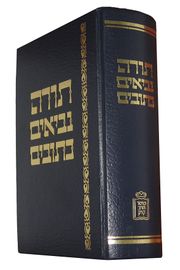Book of Haggai
The Book of Haggai is a book of the Hebrew Bible, written by the prophet Haggai. It was written in 520 BCE some 18 years after Cyrus had conquered Babylon and issued a decree in 538 BCE allowing the captive Jews to return to Judea. He saw the restoration of the temple as necessary for the restoration of the religious practices and a sense of peoplehood after a long exile.
It consists of two simple, comprehensive chapters. The object of the prophet is generally urging the people to proceed with the rebuilding of the second Jerusalem temple in 521 BCE after the return of the deportees. Haggai attributes a recent drought to the peoples' refusal to rebuild the temple, which he sees as key to Jerusalem’s glory. The book ends with the prediction of the downfall of kingdoms, with one Zerubbabel, governor of Judah, as the Lord’s chosen leader. The language here is not as finely wrought as in some other books of the minor prophets, yet the intent seems straightforward.
The first chapter contains the first address (2-11) and its effects (12-15). The second chapter contains:
- The second prophecy (1-9), which was delivered a month after the first
- The third prophecy (10-19), delivered two months and three days after the second; and
- The fourth prophecy (20-23), delivered on the same day as the third
These discourses are referred to in Ezra 5:1 and 6:14. (Compare Haggai 2:7, 8 and 22)
Haggai reports that three weeks after his first prophecy, the rebuilding of the Temple began on September 7 521 BCE. "They came and began to work on the house of the LORD Almighty, their God, on the twenty-fourth day of the sixth month in the second year of King Darius.(Haggai 1:14-15) and the Book of Ezra indicates that it was finished on February 25 516 BCE "The Temple was completed on the third day of the month Adar, in the sixth year of the reign of King Darius." (Ezra 6:15)
Outline of His Life
|
Part of a series
of articles on the |
|---|
| Tanakh (Books common to all Christian and Judaic canons) |
| Genesis · Exodus · Leviticus · Numbers · Deuteronomy · Joshua · Judges · Ruth · 1–2 Samuel · 1–2 Kings · 1–2 Chronicles · Ezra (Esdras) · Nehemiah · Esther · Job · Psalms · Proverbs · Ecclesiastes · Song of Songs · Isaiah · Jeremiah · Lamentations · Ezekiel · Daniel · Minor prophets |
| Deuterocanon |
| Tobit · Judith · 1 Maccabees · 2 Maccabees · Wisdom (of Solomon) · Sirach · Baruch · Letter of Jeremiah · Additions to Daniel · Additions to Esther |
| Greek and Slavonic Orthodox canon |
| 1 Esdras · 3 Maccabees · Prayer of Manasseh · Psalm 151 |
| Georgian Orthodox canon |
| 4 Maccabees · 2 Esdras |
| Ethiopian Orthodox "narrow" canon |
| Apocalypse of Ezra · Jubilees · Enoch · 1–3 Meqabyan · 4 Baruch |
| Syriac Peshitta |
| Psalms 152–155 · 2 Baruch · Letter of Baruch |
|
|
- Divine Announcement: The Command to Rebuild the Temple ( 1.1-15 )
- Divine Announcement: The Coming Glory of the Temple ( 1.15-2.9 )
- Divine Announcement: Blessings for a Defiled People ( 2.10-19 )
- Divine Announcement: Zerubbabel Chosen as a Signet ( 2.20-23 )
Messianic Interpretation in the New Testament
The rebuilding of the Temple prefigures the building of New Testament temples: the Messianic assembly (1Cor. 3.16; Eph. 2.20-22) and the new Jerusalem (Rev. 21:9–22:5).
1.2 The House of the Lord symbolizes His presence and looks forward to the Messiah as temple (John 1.14; 2.19–21), the Messianic assembly as temple (1Cor. 3.16; Eph. 2.20-22), and the dwelling of God in the new Jerusalem (Rev. 21.3; 21:22–22:5).
1.13 The promise to be with the people anticipates God being with His people in the Messiah (Matt. 1.23, “Immanuel”) and through the Spirit of the Messiah (Rom. 8.9-10; 1Cor. 3.16).
2.4 Our work is not in vain in the Lord (1Cor. 15.58; Phil. 2.12–13).
2.6 God shakes the old order, showing that we should put our hope in his unshakable kingdom in the Messiah (Heb. 12.26–28).
2.7 The ultimate glory of God is found in the Messiah (John 1.14; Rev. 21:22–23).
External links
| First Prophets |
|---|
| 1. Joshua |
| 2. Judges |
| 3. Samuel |
| 4. Kings |
| Later Prophets |
| 5. Isaiah |
| 6. Jeremiah |
| 7. Ezekiel |
| 8. 12 minor prophets |
- Jewish translations:
- Chaggai - Haggai (Judaica Press) translation [with Rashi's commentary] at Chabad.org
- Christian translations:
- Online Bible at GospelHall.org (ESV, KJV, Darby, American Standard Version, Bible in Basic English)
| Preceded by Zephaniah |
Hebrew Bible | Followed by Zechariah |
| 'Christian' Old Testament |
